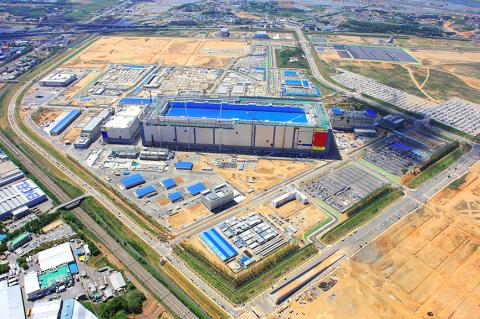Samsung Electronics Co is to invest nearly US$18 billion in its chip business, the South Korean firm said yesterday, as it seeks to expand its lead in the global memorychip and smartphone markets.
The world’s top manufacturer of smartphones and memory chips would invest 20.4 trillion won (US$17.7 billion) by 2021 to expand and upgrade its chip plants in the South Korean cities of Pyeongtaek and Hwaseong, it said in a statement.
The factory in Pyeongtaek, 70km south of Seoul, is the world’s biggest and recently began production after Samsung Electronics spent 15.6 trillion won over the past two years to build it.

Photo: AFP/Samsung Electronics
The company also plans to expand its NAND chip plant in the Chinese city of Xian to meet booming demand for the chips used in high-end storage products, it said.
It did not elaborate on when and how much money it plans to invest there.
In smartphones, Samsung has been increasingly sandwiched by smaller Chinese rivals in the low and mid-end markets, and by Apple Inc’s iPhone in the high-end segment.
It also suffered a blow to its reputation after a humiliating mass recall last year of its Galaxy Note 7 smartphone over faulty, exploding batteries.
However, the firm managed to post stellar profits partly thanks to the robust chip business, which supplies not only its own handset unit, but also other electronics giants, including Apple.
Samsung Electronics — which accounted for more than 40 percent of global memorychip sales in the first quarter of this year — in April posted its biggest quarterly net profit in more than three years.
“Our clients are having difficulty securing enough semiconductor chips due to growing global demand for high-tech gadgets,” it said.
“We plan to actively respond to those demands by making aggressive investments on our production lines at home and abroad,” it said.
Analysts say a global shortage of chips may persist throughout this year, driving prices higher and benefiting major suppliers, such as Samsung and another South Korean chipmaker, SK Hynix.
Average prices for DRAM chips used in PCs and servers, and NAND flash chips used in handsets are expected to jump 53 percent and 28 percent respectively this year, according to market researcher IC Insights.
The announcement also came after South Korean President Moon Jae-in set tackling rising unemployment as his top priority.
Samsung said its investment would eventually help create as many as 440,000 jobs through 2021, including indirectly, and help bolster Asia’s fourth-largest economy.

With an approval rating of just two percent, Peruvian President Dina Boluarte might be the world’s most unpopular leader, according to pollsters. Protests greeted her rise to power 29 months ago, and have marked her entire term — joined by assorted scandals, investigations, controversies and a surge in gang violence. The 63-year-old is the target of a dozen probes, including for her alleged failure to declare gifts of luxury jewels and watches, a scandal inevitably dubbed “Rolexgate.” She is also under the microscope for a two-week undeclared absence for nose surgery — which she insists was medical, not cosmetic — and is

CAUTIOUS RECOVERY: While the manufacturing sector returned to growth amid the US-China trade truce, firms remain wary as uncertainty clouds the outlook, the CIER said The local manufacturing sector returned to expansion last month, as the official purchasing managers’ index (PMI) rose 2.1 points to 51.0, driven by a temporary easing in US-China trade tensions, the Chung-Hua Institution for Economic Research (CIER, 中華經濟研究院) said yesterday. The PMI gauges the health of the manufacturing industry, with readings above 50 indicating expansion and those below 50 signaling contraction. “Firms are not as pessimistic as they were in April, but they remain far from optimistic,” CIER president Lien Hsien-ming (連賢明) said at a news conference. The full impact of US tariff decisions is unlikely to become clear until later this month

GROWING CONCERN: Some senior Trump administration officials opposed the UAE expansion over fears that another TSMC project could jeopardize its US investment Taiwan Semiconductor Manufacturing Co (TSMC, 台積電) is evaluating building an advanced production facility in the United Arab Emirates (UAE) and has discussed the possibility with officials in US President Donald Trump’s administration, people familiar with the matter said, in a potentially major bet on the Middle East that would only come to fruition with Washington’s approval. The company has had multiple meetings in the past few months with US Special Envoy to the Middle East Steve Witkoff and officials from MGX, an influential investment vehicle overseen by the UAE president’s brother, the people said. The conversations are a continuation of talks that

CHIP DUTIES: TSMC said it voiced its concerns to Washington about tariffs, telling the US commerce department that it wants ‘fair treatment’ to protect its competitiveness Taiwan Semiconductor Manufacturing Co (TSMC, 台積電) yesterday reiterated robust business prospects for this year as strong artificial intelligence (AI) chip demand from Nvidia Corp and other customers would absorb the impacts of US tariffs. “The impact of tariffs would be indirect, as the custom tax is the importers’ responsibility, not the exporters,” TSMC chairman and chief executive officer C.C. Wei (魏哲家) said at the chipmaker’s annual shareholders’ meeting in Hsinchu City. TSMC’s business could be affected if people become reluctant to buy electronics due to inflated prices, Wei said. In addition, the chipmaker has voiced its concern to the US Department of Commerce